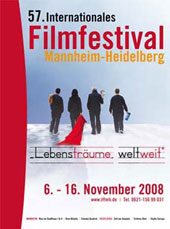|
57th Mannheim/Heidelberg Film Festival (Nov. 6-16, 2008(
Women's Festival
by Manouchehr Najafpour
|
 When a festival ages, it gets smaller and friendlier. In the past years, sometimes more than 100 films were screened in these two cities and the number of films in competition section could reach the staggering number of 40. But this year, only 18 films were in competition. Short and documentary film sections were cancelled a few years ago and the total number of films to be screened this year was only 50. About these changes and reduced number of films, Michael Koetz, the director of the Festival says: “We have a selection committee and they watch almost 1,000 films every year from all over the world and try to choose the best films made by young filmmakers. The quality and innovative nature of the films are very important for us; that's why we choose them carefully. With all of our experience in recent years, the public does not want to become confused or to be in shortage of time.” When a festival ages, it gets smaller and friendlier. In the past years, sometimes more than 100 films were screened in these two cities and the number of films in competition section could reach the staggering number of 40. But this year, only 18 films were in competition. Short and documentary film sections were cancelled a few years ago and the total number of films to be screened this year was only 50. About these changes and reduced number of films, Michael Koetz, the director of the Festival says: “We have a selection committee and they watch almost 1,000 films every year from all over the world and try to choose the best films made by young filmmakers. The quality and innovative nature of the films are very important for us; that's why we choose them carefully. With all of our experience in recent years, the public does not want to become confused or to be in shortage of time.”
This time, most of the films (15 of them) were made by women directors. This number is very interesting for a festival which has no claim to being a showcase for women or feminists. In theaters and the center of the Festival one could notice the vast presence of young women directors. In theaters, too, the vast majority of viewers were women. Because of the coziness of the Festival, the audience could gather around a director and there were interesting discussions between them. The experience of recent years shows that the German public is very curious about the problems of women in other countries.
Inauguration ceremony at a large tent
As usual, the inauguration ceremony is held in Heidelberg. In the center of the city, at the University Square, they have erected a large and beautiful tarpaulin tent. In this tent, there were a lobby and a theater with a capacity of 1,000 people. Mayors of both cities and also cultural, political and artistic personalities were present. As usual, the first rows were reserved for the city authorities that were present only at the inaugural and closing ceremonies. Of course, the director of the Festival knows very well how to use their clout and financial capacities to secure the Festival's budget. Obviously, he knows that this kind of protocol is only a seasoning at the background of economic policies of the Festival.
Heidelberg is an academic city, so you see many students among the audience whose numbers are on the rise year by year. This enthusiasm is so inspiring that the director of the Festival also becomes enthusiastic and reads passionate texts about cinema and its concepts which are well received by the public. This year, he talked about the role of cinematography and the importance of auteur in the cinema. The first film screened was The Baby Formula directed by Alison Reid from Canada. It is the story of two pregnant women who have a strong friendship. Filled with emotion, they express their feelings and mental conditions during the period of pregnancy. They laugh at their husbands who don't share these emotions. Besides, they have different opinions about medical care rendered by their physicians, their different functions and prescriptions for the pregnant women. The film is full of sharp dialogues along with comic situations which are sometimes funny and sometimes crude and tasteless. Normally, the opening films are not the best but they receive a lot of exaggerated publicity.
Human aspirations and dreams
In recent years, the competition section has been more interested in films that challenge the human dreams and hopes. The striking Hungarian documentary Another Planet directed by Franco Moldovanyi has cast a humane look at the lives of Third World children. In a period of two years, it follows seven children who live in deplorable conditions in Africa, Latin America and South Asia. These are the children who are abused, the little girls who are forced into prostitution, adolescents in Cambodia, Ecuador and Congo who are recruited as militia, or small children in Mexican slums who dig the garbage like rats to find something to eat.
SUBSCRIBE
[Page: 128]
|
|
|
|
|
President & Publisher
Massoud Mehrabi
Editors:
Sohrab Soori
Translators:
Sohrab Soori
Behrouz Tourani
Zohreh Khatibi
Saeed Khamoush
Contributors
Shahzad Rahmati
Saeed Ghotbizadeh
Advertisements
Mohammad Mohammadian
Art Director
Babak Kassiri
Ad Designers
Amir Kheirandish
Hossein Kheirandish
Cover Design
Alireza Amakchi
Correspondents
E.Emrani & M. Behraznia (Germany)
Mohammad Haghighat (France)
A. Movahed & M. Amini (Italy)
Robert Richter (Switzerland)
F. Shafaghi (Canada)
B. Pakzad (UAE)
H. Rasti (Japan)
Print Supervisors
Shad-Rang
Noghreh-Abi
Gol-Naghsh
Subscription & Advertising Sales
Address: 10, Sam St., Hafez Ave., TEHRAN, IRAN
Phone: +98 21 66722444
Fax: +98 21 66718871
info@film-magazine.com
Copyright: Film International
© All rights reserved,
2023, Film International
Quarterly Magazine (ISSN 1021-6510)
Editorial Office: 5th Floor, No. 12
Sam St., Hafez Ave., Tehran 11389, Iran
*
All articles represent views of their
authors and not necessarily
those of the editors
|
|
|

